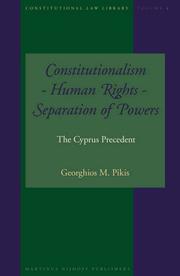| Listing 1 - 3 of 3 |
Sort by
|

ISBN: 1281926116 9786611926113 9047410211 9789047410218 9789004152410 9004152415 Year: 2006 Publisher: Leiden Boston Martinus Nijhoff
Abstract | Keywords | Export | Availability | Bookmark
 Loading...
Loading...Choose an application
- Reference Manager
- EndNote
- RefWorks (Direct export to RefWorks)
Following 82 years of British rule, Cyprus emerged in 1960 as an independent state endowed with a written Constitution, detailed to the extent of making provision for nearly every aspect of government. Two distinct features of the Constitution are a) the incorporation of a comprehensive charter of human rights backed up by a duty cast on every authority of the State to ensure its efficient application and b) the strict separation between the three powers of the State. Another notable aspect of it is the introduction of judicial review of administrative action rendering justiciable every act, decision or omission of every organ, body or person exercising administrative or executive authority. The diversity of the sources of constitutional order, its detailed provisions about nearly every aspect of government convey a distinct complexion to the Constitution of the country. This book covers its application in the turbulent history of the island, which provides a singular if not a unique example of the sustenance of constitutional order in extreme circumstances; constitutionalism in full swing.
Constitutional law --- Human rights --- Judicial review --- Basic rights --- Civil rights (International law) --- Rights, Human --- Rights of man --- Human security --- Transitional justice --- Truth commissions --- Review, Judicial --- Courts --- Delegation of powers --- Executive power --- Judicial power --- Legislation --- Legislative power --- Rule of law --- Separation of powers --- Law and legislation
Book
ISBN: 1282952889 9786612952883 900418967X 9789004189676 6612952881 9789004186132 9004186131 Year: 2010 Publisher: Leiden Boston Martinus Nijhoff Publishers
Abstract | Keywords | Export | Availability | Bookmark
 Loading...
Loading...Choose an application
- Reference Manager
- EndNote
- RefWorks (Direct export to RefWorks)
The Rome Statute and sequential establishment of the ICC is a milestone in the history of man. It inaugurates a new era of the supremacy of the law as the goal of humanity rendering everyone, independently of rank or position, liable for the commission of the heinous crimes within the jurisdiction of the Court; genocide, crimes against humanity, war crimes and aggression. The object is to end immunity and leave no quarter to people committing crimes that have scarred and defaced humanity. The book analyses every aspect of the Statute and supplementary instruments, eliciting the framework of it
Book
ISBN: 9004313737 Year: 2017 Publisher: Leiden ; Boston : Brill,
Abstract | Keywords | Export | Availability | Bookmark
 Loading...
Loading...Choose an application
- Reference Manager
- EndNote
- RefWorks (Direct export to RefWorks)
This book deals with the genesis, formation and development of two fundamental aspects of English Law, common law and equity. The common law laid down the rules governing cohabitation in communities and human rights. Equity was the offspring of natural law designed to prevent and remedy injustice resulting from unconscionable conduct. English law including both common law and equity was introduced in former British Colonies and dominions. In most of them it was retained after independence. This is the principal legacy of English colonization of countries. The introduction, application and retention of English law is reflected in Cyprus, a former British colony.
Law --- Common law --- English influences. --- Reception
| Listing 1 - 3 of 3 |
Sort by
|

 Search
Search Feedback
Feedback About UniCat
About UniCat  Help
Help News
News